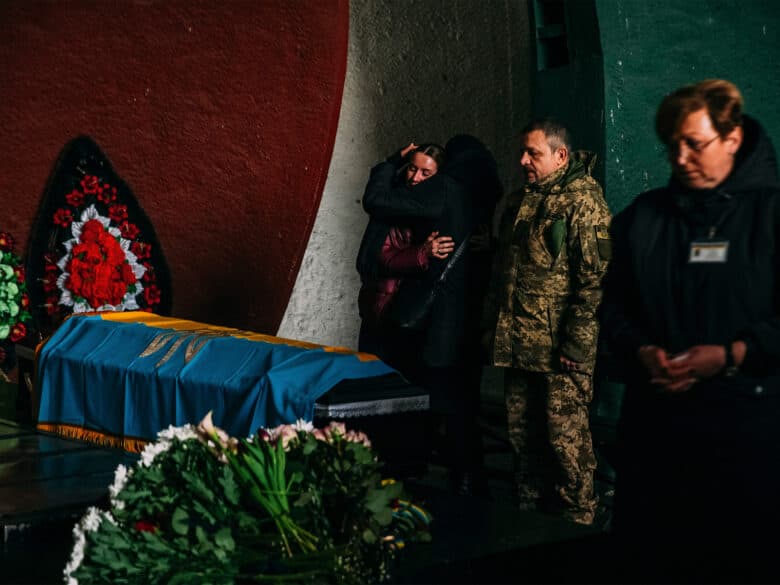Giles Duley: Voices from Chad

We sit cross-legged in awkward silence, in the shade of an umbrella thorn tree. Yesterday the conversation flowed as we cooked together; now, with a formal meeting, nothing, until one of the elders stands.
“There were two men who’d been smoking bangu [weed] all day while walking,” he says. “By the time night came they were so high that they were completely lost. Entering a village, one of the men saw the moon, and is shocked by how late it is.
“‘Is that the moon?!’ he says.
“‘I don’t know,’ the other replies. ‘I’m not from this village.’”
The other elders burst into laughter and, with the ice broken, our conversation begins.
I’m here in Adré, Chad, with the NGO Humanity & Inclusion to learn more about the situation for Sudanese refugees and see what support we can provide, most especially for those with disabilities. Adré, a border town, has become a spontaneous refugee site, with nearly 200,000 Sudanese seeking safety there. Across Chad there are over a million refugees.
Since 2003, Darfur, a region of western Sudan, has seen extreme ethnic violence. In September 2004, Colin Powell, the US Secretary of State at the time, declared the killing, sexual violence and displacement of the Fur, Masalit and Zaghawa ethnic groups a genocide. In the following years, the violence in Darfur calmed, but in April 2023 the power struggle between the Sudanese Armed Forces (SAF) and the Rapid Support Forces (RSF) erupted into civil war, reigniting the violence there. In the week I’ve been in Adré, I’ve listened to some of the most harrowing stories I’ve encountered in 20 years of documenting conflict. Families burnt alive as they slept, mass rapes and mutilation of women and children, whole villages massacred. The Black ethnic Darfuris are facing unimaginable horror while the world is largely silent.

“The problem is that when you have a camel, they will kill you,” the elders, who are from the Masalit tribe, explain. “If you have a good horse, they will kill you and take your horse. Then they come into the village and take all the property in the village, like cows, camels. And next they started to burn down the villages. After they burn the villages [they] kill people – so people will not stay at the same place – or then start to the next village. The Arabs want to make Darfur their land, that’s why we, those who are Black, they don’t want. If you are Masalit or from another tribe who is Black, you don’t have the right to stay in Darfur. They kill us one by one and tribe by tribe. They want to eliminate all those who are Black in Darfur.
“They killed more than 2,000 people in one day. Those who are burned down by fire, those who were shot by guns, there are many kinds of killing in Sudan. This is our story of why we left El Geneina [in west Darfur] and we ran to Chad. This is the summary of the problem.”
A few metres from where the Masalit elders gather each day, in a tukul hut, Nawali shelters from the heat and dust. She had been using a wheelchair and hand-driven tricycle since she was paralysed at three from malaria. When the Janjaweed, a Sudanese Arab militia group connected to the RSF, attacked her village last year, they burnt down her house and stole her tricycle. She had to crawl to safety.
Since arriving at the camp she has not been provided with a wheelchair, so rarely leaves her tent. To get to the toilet, she must drag herself across the ground. Not only is this humiliating for her, but it also leaves her incredibly vulnerable. This is the situation for many refugees living with disability.
“But I am not worried about myself,” Nawali tells me. “I’m worried about my grandmother – she’s too old. And she needs things to be better, [have] better food to eat and shelter. But we have nothing.”
“The war started in April and the rebels came and attacked El Geneina with RPGs and grenades,” Firdoz, who I meet while she is collecting firewood in the shrubland by the camp, explains. “They did not differentiate between men, women and children. When they fire their rockets, you will see ten or twenty people die at once. Because of these rockets and bullets nobody would stay in the town. So we had no choice but to move and run to the border. The rebels followed us and were firing after the people at the back of the group. We lost a lot of our friends and parents. We lost our mothers, our fathers, our brothers, our children.

“It is hard for the women. It’s the women who had to carry the children and run away. And here it’s very hard to find something to eat. Also if a woman goes out into the bush in Sudan they will grab her and take her off. Here it’s safer but there are also problems.”
When I ask everyone I meet in the camp what their dream is, it’s always to return to their land. To grow their crops, to see their children in school, their loved ones safe. But as they begin to bus the thousands of refugees into official camps deeper within Chad, and as the violence in Sudan continues, that dream seems further away than ever.
On the last day, as I’m about to leave, Ahmad Mohammad Ahmat, the leader of the elders, pulls me aside.
“The Masalit have rights, the right to die in our land,” he says, “because it is our land, we don’t have another land. We have the right to die there. We will not give up, even if they exterminate us all we will not give up.”
You can donate to the Legacy of War Foundation’s fundraising efforts for Sudanese refugees in Chad here.
- Photographer and WriterGiles Duley



